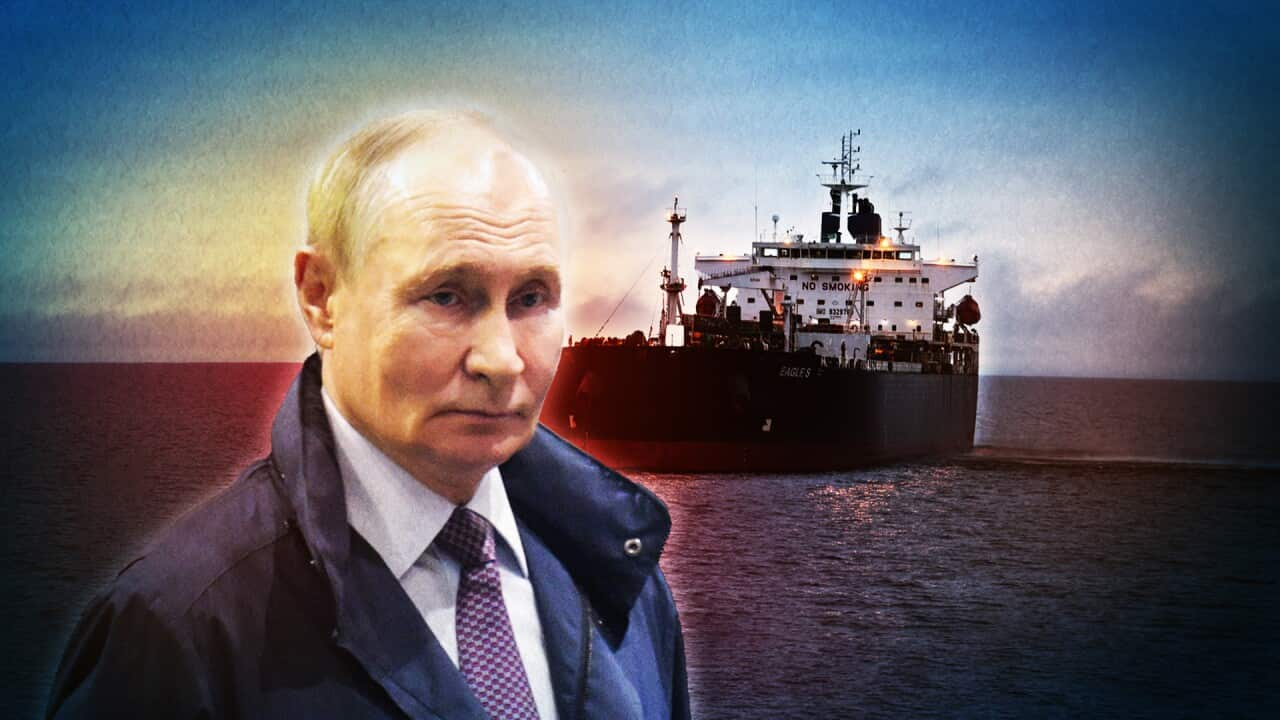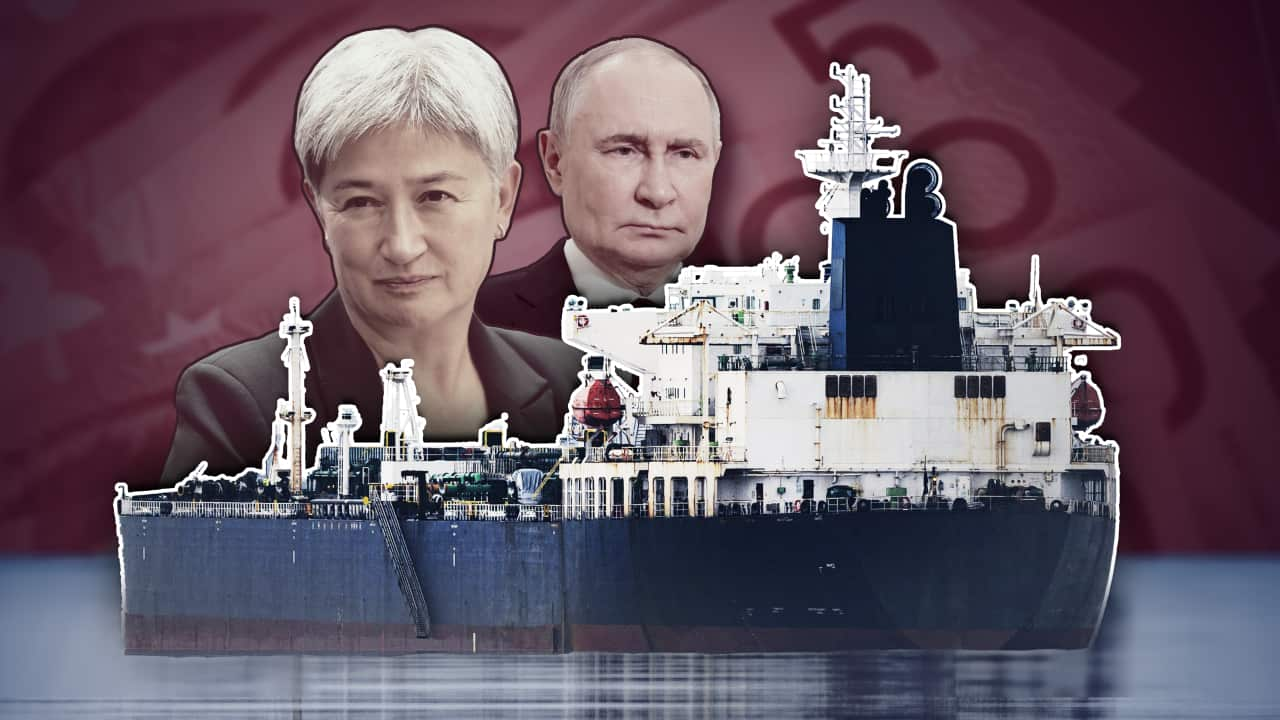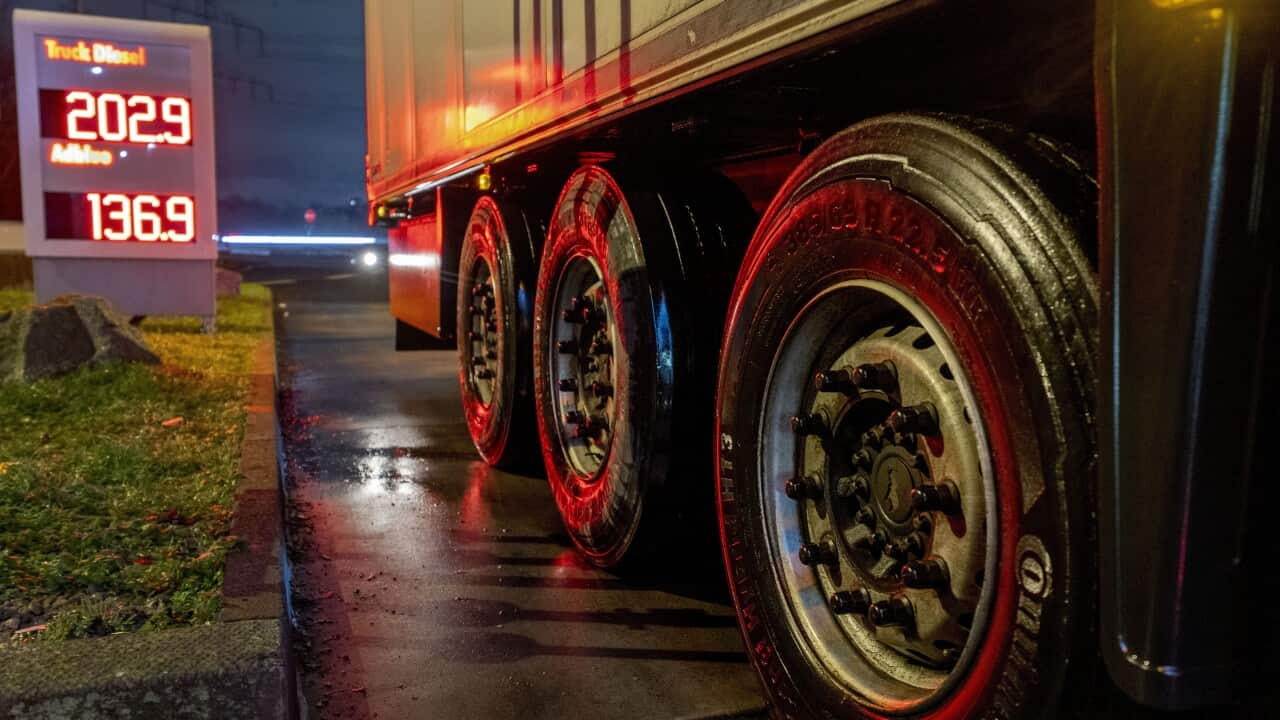

Exclusive
Revealed: Sanctioned Russian 'shadow' tankers in Australian oil product supply chains
Data shows more than a third of oil tankers from Russia's 'shadow fleet' sanctioned in June are supplying Australian companies.
Published
In a bid to "starve" Russia's economy of oil revenue, the Australian government has sanctioned more than 150 oil tankers from Russia's so-called 'shadow fleet'.
The first 60 ships were sanctioned in June 2025, following similar moves by the United Kingdom, Canada and the European Union, with a further 95 added to the list last month.
But despite this, SBS News can reveal at least 25 of them remain in the supply chains of Australian companies.
The exclusive data compiled by the Centre for Research on Energy and Clean Air (CREA) and provided to SBS News tracks the movement of sanctioned shadow fleet tankers from Russia to refineries in India and China that export oil products to Australia.
CREA's EU-Russia analyst, Vaibhav Raghunandan, says it raises questions about the effectiveness of sanctioning the vessels only.
"[It would be] much more pertinent from Australia's point of view to cut Russian oil from their supply chain, rather than expanding on vessel sanctions only," Raghunandan tells SBS News.
"There has to be a twofold effort to constrict Russian avenues."
Australia sanctioned the direct import of crude oil and refined oil products from Russia soon after its full-scale invasion of Ukraine in February 2022.
However, in 2024, submissions to a Senate inquiry into Australia's support for Ukraine exposed a loophole involving the import of oil products refined from Russian crude in third countries, indirectly supporting Russia's war. A Senate inquiry into Australia's support for Ukraine recommended in September that the Australian government improve the tracking of such products and prevent their sale in Australia.
To date, the federal government has not moved to sanction individual refineries or the import of products refined from Russian crude. It has consistently defended its position, saying there are no mechanisms to track oil products refined in third countries and that the private sector should take responsibility for its supply chains.
But with data revealing, for the first time, that some of the sanctioned shadow fleet tankers are still operating in Australian supply chains, one expert suggests the federal government is creating "a perception that it is tackling this problem".
How is Russia's 'shadow fleet' evading sanctions?
Following Russia's full-scale invasion of Ukraine in February 2022, a coalition of countries, including Australia, imposed a price cap on Russia's crude oil at US$60 ($92) per barrel. In September, the coalition agreed to lower the cap to US$47.60 ($73) per barrel, with Australia joining in.
Anton Moiseienko is a senior lecturer in law at the Australian National University, whose work focuses on the legal and policy aspects of economic sanctions. He tells SBS News the cap is designed to lower Russia's oil revenues.
"The oil price cap […] sets the price at which Russian oil is allowed to be traded with third countries such as India, China, and others," he says.
They want to constrict the access of the Kremlin to those revenues, but they don't want to limit the supply of oil to global markets.
Moiseienko explains the cap was designed to be enforced through maritime cargo and shipping insurance companies, which cover oil cargoes and the vessels that transport them, noting the vast majority are based in London.
The scheme prohibits financial institutions and logistics companies from engaging in any transactions involving the trade and transportation of Russian oil above the price cap.
"That was thought to ensure that the global maritime trade would only take place below the cap," Moiseienko explains.
However, Russia has started using uninsured oil tankers: the shadow fleet.
"[It's] a fleet of rickety, barely sea-worthy vessels that don't worry about those niceties such as insurance, and simply ferry Russian oil from locations in Russia to refineries in India, China, and elsewhere," he says.
"That means that the price cap is not working because those refineries keep buying Russian oil above the price cap and the shadow fleet is facilitating that."
Sanctioned tankers in Australian supply chains
Since February 2022, CREA has been tracking Russia's fossil fuel flows and revenues using real-time data from Kpler, a service provider that collates maritime traffic, shipping, customs and market data. CREA, based in Finland, also uses separate customs data from the EU and other countries.
Between June and September 2025, data shows 25 sanctioned vessels delivered Russian crude oil to four refineries: Jamnagar and New Mangalore in India, and Qingdao and Dalian in China. All four supply oil products to Australia.
Raghunandan says the vast majority of oil transported via these vessels was delivered to just one of the four refineries: the Jamnagar refinery, serviced by Sikka port on India's west coast.
"According to our data, 85 per cent of the volume of oil delivered by these vessels has been to the Jamnagar refinery, which exports oil products to Australia," he says.
Raghunandan says: "In a sense, Australia is undermining its own vessel sanctions by continuing to import from a refinery that does not adhere [to] or respect these vessel sanctions."
"You're essentially boosting and encouraging the Russian oil trade by not imposing sanctions on the refinery or putting a ban in place on refined oil products made from Russian crude itself."
'Crucial' to Russia's trade
Earlier this week, United States President Donald Trump announced sanctions against Russia's two major oil companies, Lukoil and Rosneft. In response, Chinese state companies are reportedly pausing imports of Russian crude oil while they assess compliance. These include PetroChina and Sinopec, which own Dalian and Qingdao refineries respectively, and export refined oil products to Australia.
Indian conglomerate Reliance Industries also reacted to the new US sanctions, along with EU sanctions that were recently tightened, on Friday.
It said in a statement they "have noted the recent restrictions" and are "currently assessing the implications, including the new compliance requirements". Reliance Industries owns the Jamnagar refinery, which exports oil products to Australia.
The company added that it will address these new conditions "while maintaining the relationships with its suppliers" and "whenever there is any guidance from the Indian government in this respect ... will be complying fully".
However, Moiseienko says, the US sanctions do not prevent Lukoil or other Russian companies from continuing to sell crude oil to refineries in India and China.
"For that to stop, stricter oil price cap enforcement and meaningful action against the shadow fleet remain necessary," he says.
He says shadow tankers can also be difficult to identify because they lack consistent common traits or markers.
"They would be flying the flag of a landlocked country or a country that doesn't really have much of a maritime fleet. Because supervisory standards there are lower, they either don't have insurance at all or they have insurance from a company that no one's ever heard about," Moiseienko says.
"That creates serious environmental risks. Because if oil is spilled and you don't have an insurer that's actually there and able to pay up, who's going to pay?"
Shadow tankers also use differing tactics to deliver sanctioned oil. Some operate as "taxis", delivering oil not only from Russia, but from other sanctioned jurisdictions, such as Iran and Venezuela.
Another phenomenon is ship-to-ship transfers, which, according to Raghunandan, help to hide the origin of the oil.
"There may be some countries that are not willing to touch these tankers [and] some ports … But that does not mean that the operations of these tankers stop," he says.
There's a huge number of sanctioned tankers out at sea.
Raghunandan says the sanctioned tankers will operate out of Russian ports, ferrying the product to a certain point at sea where a transfer can be made with other vessels.
"These sanctioned tankers will conduct ship-to-ship operations with a non-sanctioned tanker, which will then deliver the oil to the port itself, therefore ensuring that the revenue is still being generated without the risk associated with it," he says.
He says the shadow fleet has become critical to Russia's oil trade in the past three years.
"In January this year, 80 per cent of the Russian crude shipped globally was shipped on shadow tankers," he says.
"So at any point of time, shadow tankers have been a very integral part of the supply chain for refineries that are using Russian crude."
Australia – the biggest importer
Addressing criticism over Russian imports via Indian and Chinese refineries last month, Foreign Minister Penny Wong said there is no mechanism that would allow the government to track the origin of crude oil from refineries in third countries.
The government has insisted it takes adequate measures to "starve Russia's war machine", including joining the price cap coalition and sanctioning Russia's shadow fleet.
Yet according to CREA, Australia is currently the biggest importer of oil products refined from Russian crude in third countries.
At Senate estimates on 10 October, Wong reiterated her statement, saying the government expects the private sector to manage its own supply chains.
"There are the expectations of the community and, in the challenges that the government has faced, we are also needing the private sector to exercise its responsibilities," she said.
Responding to questions during the estimates hearing, Wong also singled out BP, a major British-based oil and gas company with operations in Australia.
"I hope that you will join me in saying to BP that there is a very strong cross-party view that we should be reducing any revenue to Mr [Vladimir] Putin, including through the provision of secondary products. There is an expectation in the community, and we would want companies to consider that expectation," she said.
SBS News contacted a number of companies that appear in CREA's data, including BP, to ask whether they are aware of sanctioned shadow fleet tankers in their supply chains and whether they would cease trading with refineries that use Russian crude oil.
Of them, five responded saying they take steps to ensure compliance with federal sanctions, but did not comment on the presence of shadow fleet tankers in their supply chains.
In a statement to SBS News, a spokesperson for BP said the company takes compliance with sanctions and export controls seriously.
"We continue to have processes and controls for maintaining compliance with applicable trade sanctions. We conduct appropriate checks on trading counterparties and documents that are used to evidence the origin of products," the spokesperson said.
SBS News also attempted to confirm CREA's Australian data set with the Australian Border Force. A spokesperson for the agency said they were unable "to confirm or disclose specific details of commercial vessel movements at Australian ports" due to "legislated privacy obligations".
'Playing whack-a-mole'
Earlier this month, the UK announced sanctions banning the import of oil products refined from Russian crude in third countries. The move followed similar sanctions agreed upon by the EU in July before being further tightened this week.
According to CREA, oil products refined from Russian crude in India and China account for less than 10 per cent of Australia's annual imports of such products.
Raghunandan says if Australia were to follow the EU and the UK, the sanctions would not significantly affect its supply.
"Australia's imports of oil products from refineries using Russian crude is a small part of its entire consumption of these products," he says.
Removing these from the entire supply is going to have no inflationary effect.
A Department of Foreign Affairs and Trade spokesperson said while it does not comment on potential sanctions, the department is "evaluating options to place further pressure on Russia's oil revenues".
But as Moiseienko explains, the current Australian legislation does not oblige importers to ensure their supply chains do not involve sanctioned tankers.
At the same time, the exact number of shadow fleet tankers operating internationally remains unknown.
He says the known vessels may be the "proverbial tip of the iceberg".
"The game that the Western nations have been playing is this whack-a-mole game where you sanction shadow fleet tankers [...] after that, there are more coming.
"The real step that Australia could take is to sanction the refineries that are buying wholesale Russian crude oil and reselling it to places like Australia.
"If the government did that, then suddenly overnight, importers would find themselves in a position where they can't keep purchasing that oil from those refineries and need to find alternative supply routes."
This story was produced in collaboration with SBS Audio.
For the latest from SBS News, download our app and subscribe to our newsletter.



